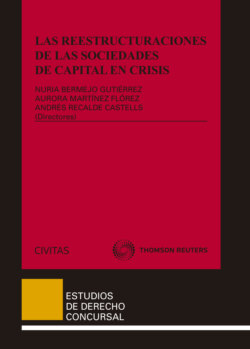Читать книгу Las reestructuraciones de las sociedades de capital en crisis - Aurora Martínez Flórez - Страница 67
На сайте Литреса книга снята с продажи.
VII. ART. 185, PARAGRAPH 6, I.B.L.
ОглавлениеAnother important and complex topic proposed by the new regulations is the connection between the provisions of art. 163, paragraph 5 and art. 185 l.b.l. about the execution of the confirmed agreement with creditors.
For the enforcement of the increase of capital provided by the restructuring plan art. 185, paragraph 6, l.b.l. could be applied (and s. also the new art. 118, paragraph 6, I. crisis c.)47).
Pursuant to this one the judicial officer –an officer appointed by the court– can replace i) the board, which has not called shareholders meeting for the adoption of the decisions within its competence (according to the substantive law) required to fulfil the confirmed plan; or ii) even shareholders, if general meeting was called by directors, auditors or by the court, but the general meeting has not taken the necessary decisions in order to comply with the confirmed agreement with creditors48). In this way, share capital increase –possibly with the exclusion of pre-emptive right– can be fulfil regardless shareholders vote.
Regarding the field of application of the article, it is held that the appointment of the judicial officer is possible only if a proposal of creditor, instead of a proposal of the company, is filed and approved by other creditors and by the court49). For this reason, if the proposal which underlies the agreement with creditors comes from the company, the ordinary remedies, but not the mechanism provided by art. 185, paragraph 6, I.b.l. or by art. 118, paragraph 6, I. crisis c., should be used to enforce the plan. This means that when the proposal comes from the distressed company the two above mentioned rules do not apply and, as a consequence, they do not overcome the problem of shareholders veto power against the enforcement of the restructuring plan approved by creditors and confirmed by the court50).
However, this conclusion does not seem correct.
Before the new Italian crisis code came in force, this conclusion could be grounded on the article 185, paragraph 3, l.b.l., which limited the duty of the debtor to comply with the agreement with creditors approved and confirmed only if the proposal was filed by creditors.
Instead the new art. 118, paragraph 3, I. crisis c. provides such a duty both in the hypothesis of creditors proposal and in the hypothesis of debtor’s one. For this reason, it is difficult not to infer from the aforementioned provision the general principle that the debtor have always the duty to enforce both his and creditors proposal, performing all the acts required for that purpose51). It is unreasonable to believe that the enforcement tools pursuant to art. 185, paragraph 6, l.b.l. (or 118, paragraph 6, I. crisis c.) are available only in case of a proposal by the creditor and not in case of a proposal from the company: the latter has to comply regularly with the provision of the plan, regardless of whoever has made the proposal52) – 53).
Such a conclusion does not necessary lead, however, to an extension of the field of application of article 185, paragraph 6, l.b.l. or of the new 118, paragraph 6, I. crisis c. to cover the case, literally unrelated, of the proposal from the distressed company.
It is plausible, indeed preferable because it is more respectful of the limited field of application of the above-mentioned rules, even a different reconstruction. If the proposal comes from the company, corporate operations provided by restructuring plan must be enforced directly by company directors –because they have the power to file the proposal in the interest of the company pursuant to art. 152 I.b.l.–, without the required application of paragraph 6 of art. 185 l.b.l. or of art. 118 I. crisis c. In this way it is possible to achieve the same effect to overcome the veto power of old shareholders regarding the implementation of the agreement with creditors54) - 55). The approved agreement with creditors may be considered a legal title to be enforced and which must produce the effects of all operations provided by the plan that underlies the restructuring agreement.
Finally, according to the legislative favour for the restructuring solutions in Italian insolvency system, we can hold that the enforcement mechanism pursuant to art. 185, paragraph 6, I.b.l. of operations about company organisation provided by the restructuring plan can be applied i) not only to the increase of legal capital mentioned by art. 163, paragraph 5, l.b.l., but also to every corporate operations (merger, division...) involving the shareholders decision power56) and ii) not only to operations that are specifically provided by the restructuring plan, but also to all those operations which are prerequisite of the latter57).
